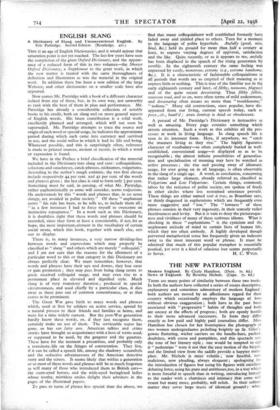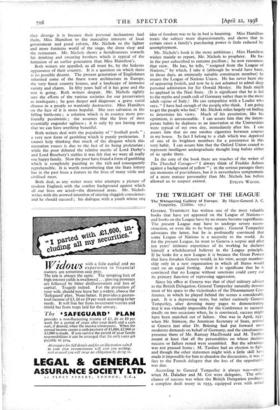THE - NEW PATRIOTISM THERE are many points of similarity between
these two books. In both the authors have collected a series of essays descriptive, explanatory and sometimes admonitory of modern England ; both authors are moved by an affectionate regard --for their- country which occasionally *employs the language of love without obvious exaggeration;, both have in the past been associated with " progressive " habits of thOughts- and both are uneasy at the effects of progress; both are openly hostile to their- more- advanced 'successors. 'In forth flier differ exactly as low paid and highly paid journalists differ. - Miss. Hamilton--has chosen for her frontispiece the photograph of two 'women undergraduates pedalling brightly up St. Giles's, gowns fluttering, wicker carriers on the handle-bars, packed. doubtless, with cocoa and pamphlets, and this spectacle sets the tone of her literary style ; one would be tempted to call it " pedestrian " were it not that the' easy motion of the bicycle and the limited view from the saddle provide a happier meta- phor: Niehols- is more VOlafile; -now fanciful, ite malicious, now pleading, always eloquent; apologising for the introduction of figures but using his figures witlf-eicellent debating force, using his puns and antitheses,too, in a way which is more forceful in speech than in writing, introducing himself to the reader :with- a chattiiiels and intimacy that some will resent but many more, probably, will relish. In their subject matter they cover large --tracts of -identical-groundl-•wher
they diverge it is because their personal inclinations lead them, Miss Hamilton to the masculine interests of local government and penal reform, Mr. Nichols to the lighter and more feminine world of the stage, the dress shop and the restaurant. Mr. Nichols Shows a fastidiousness towards his drinking and swearing brothers which is typical of the feminism of an earlier generation than Miss Hamilton's.
Both writers are appalled, as all must be, by the hideous appearance of their country. It is a question on which there is no possible dissent. The present generation of Englishmen inherited some of the finest town architecture in Europe, the very finest country houses, and a landscape of immense variety and charm. In fifty years half of it has gone and the rest is going. Both writers despair. Mr. Nichols rightly sees the efforts of the various societies for our preservation as inadequate ; he goes deeper and diagnoses a grave social disease. in a people so wantonly destructive. Miss Hamilton on the face of it is more hopeful. She sees salvation in the falling birth-rate ; a solution which is in . essence more pro- foundly pessimistic ; she assumes that the lives of men essentially engender ugliness ; it is only by not having men that we can have anything beautiful.
Both writers deal with the popularity of " football pools " ; a very new form of gambling which is purely proletarian. I cannot help thinking that much of the disquiet which this recreation rouses is due to the fact of its being proletarian ; while the poor debated the relative merits of Lord Derby's and Lord Rosebery's stables it was felt that we were all really one happy family. Now the poor have found a form of gambling which is completely puzzling to the rich and consequently reprehensible. It is worth remembering that the State lottery has in the past been a feature in the lives of many virile and civilised races.
Both deal, as any writer must who attempts a picture of modern England, with the sombre background against which all our lives are acted—the distressed areas. Mr. Nichol. writes with the avowed intention of stirring sluggish conscience; and he should succeed ; his dialogue with a youth whose one idea of freedom was to lie in bed is haunting. Miss Hamilton treats the subject more dispassionately, and shows that in certain cases a family's purchasing power is little reduced by unemployment.
Mr. Nichols's book is the more ambitious ; Miss Hamilton wishes mainly to report, Mr. Nichols to prophesy. He has in the past subscribed to extreme pacifism ; he now renounces that view. He has, he tells, " resigned from the League of Nations," by which, I take it (although he would have been, in those days, an eminently suitable constituent member) he means the League of Nations Union. He has never been shy of appearing foolish, and now he is not ashamed to admit deep personal admiration for Sir Oswald Mosley. He finds mah to applaud in the Nazi State. (It is significant that he is led to the myths and youth cult of Germany rather than to the more adult regime of Italy.) He can sympathise with a Leader who says, " I have had enough of the people; who think. I am going to get the people who feel." Mr. Nichols relies largely on feeling to determine his views. Much of his pessimism, like his optimism, is unreasonable. I can assure him that the intem- perate habits he deplores as an innovation at the Universities were typical of my own day, immediately after his. I can assure him that no one smokes cigarettes between courses in my house. In fact I belong to a club which was deprived of one of its brightest members for a persistence in this very habit. I can assure him that the Oxford Union ceased to represent intelligent undergraduate thought long before either of us spoke there.
In the core of the book there are touches of the writer of The Thatched Cottage—" I always think of Freddie Ashton against a background of yellow " ; in the serious passages there are moments of peevishness, but it is nevertheless symptomatic of a more mature personality than Mr. Nichols has before allowed us to suspect existed. EVELYN W.AUGH.











































 Previous page
Previous page